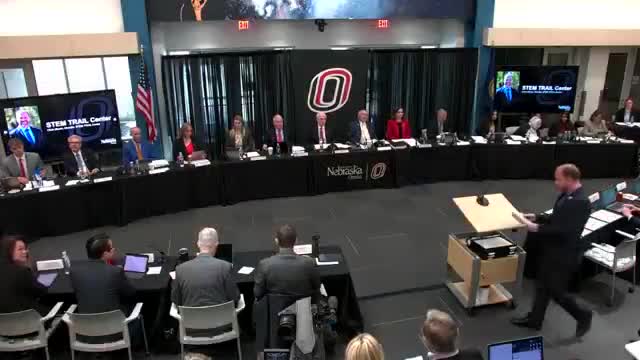UNO leaders present STEM Trail Center and a push for 'skill‑based economy' pathways
May 04, 2025 | Board of Regents of the University of Nebraska, Elected Officials, Organizations, Executive, Nebraska
This article was created by AI summarizing key points discussed. AI makes mistakes, so for full details and context, please refer to the video of the full meeting. Please report any errors so we can fix them. Report an error »

University of Nebraska at Omaha faculty and campus leaders briefed the Board of Regents on April 11 about a new STEM teaching, research and inquiry‑based learning facility and a strategy they call advancing a skill‑based economy.
Chris Moore, professor of physics and director of the UNO STEM Trail Center, described the facility as a pedagogical model used by nearly 2,000 UNO undergraduates this academic year and as a site for summer camps and community programming that the campus estimates reaches more than 16,000 youth in Omaha. “A one‑week session in our summer camps for third‑ through tenth‑graders leads to a 15% increase in interest in STEM careers,” Moore said, citing the center’s internal evaluation data.
Chancellor Jolie (UNO) outlined a multi‑pronged workforce strategy emphasizing paid internships, competency‑based learning, microcredentials, cooperative education pilots and campus partnerships with employers. She said UNO’s Career Connect initiative has secured paid internship commitments from additional employers and that 11,429 paid internship positions have been posted on UNO’s Handshake platform. The chancellor also described a soon‑to‑launch competency, skills and workforce development hub that UNO seeks to designate as a University of Nebraska center.
Other highlights the chancellor presented include:
- A cooperative‑education pilot in logistics and supply‑chain management linking UNO with employers such as Valmont and Union Pacific.
- Development of 26 microcredentials covering topics from AI to grant development, intended to attract adult and nontraditional learners.
- An AI learning lab launched in 2023 for faculty and staff, with “nearly 1,000 people at UNO using enterprise gen AI” in daily work, and more than 70 faculty revising courses to incorporate hands‑on AI experience.
The chancellor framed the initiatives as steps to keep universities aligned with employer demand and to expand non‑degree pathways to “gainful employment and social and economic mobility,” while retaining the value of bachelor’s degrees.
Why this matters: UNO leaders tied campus investments to regional workforce needs, rural‑urban talent retention for Nebraska and expanded access for adult learners and employers seeking upskilling. The board heard this report as part of a campus visit and as context for later agenda items that touch on academic programming and construction projects.
What’s next: Campus leaders requested continued board support for the competency center designation and for workforce partnerships; they said they will report back as pilot programs and microcredential offerings scale.
Chris Moore, professor of physics and director of the UNO STEM Trail Center, described the facility as a pedagogical model used by nearly 2,000 UNO undergraduates this academic year and as a site for summer camps and community programming that the campus estimates reaches more than 16,000 youth in Omaha. “A one‑week session in our summer camps for third‑ through tenth‑graders leads to a 15% increase in interest in STEM careers,” Moore said, citing the center’s internal evaluation data.
Chancellor Jolie (UNO) outlined a multi‑pronged workforce strategy emphasizing paid internships, competency‑based learning, microcredentials, cooperative education pilots and campus partnerships with employers. She said UNO’s Career Connect initiative has secured paid internship commitments from additional employers and that 11,429 paid internship positions have been posted on UNO’s Handshake platform. The chancellor also described a soon‑to‑launch competency, skills and workforce development hub that UNO seeks to designate as a University of Nebraska center.
Other highlights the chancellor presented include:
- A cooperative‑education pilot in logistics and supply‑chain management linking UNO with employers such as Valmont and Union Pacific.
- Development of 26 microcredentials covering topics from AI to grant development, intended to attract adult and nontraditional learners.
- An AI learning lab launched in 2023 for faculty and staff, with “nearly 1,000 people at UNO using enterprise gen AI” in daily work, and more than 70 faculty revising courses to incorporate hands‑on AI experience.
The chancellor framed the initiatives as steps to keep universities aligned with employer demand and to expand non‑degree pathways to “gainful employment and social and economic mobility,” while retaining the value of bachelor’s degrees.
Why this matters: UNO leaders tied campus investments to regional workforce needs, rural‑urban talent retention for Nebraska and expanded access for adult learners and employers seeking upskilling. The board heard this report as part of a campus visit and as context for later agenda items that touch on academic programming and construction projects.
What’s next: Campus leaders requested continued board support for the competency center designation and for workforce partnerships; they said they will report back as pilot programs and microcredential offerings scale.
View full meeting
This article is based on a recent meeting—watch the full video and explore the complete transcript for deeper insights into the discussion.
View full meeting
